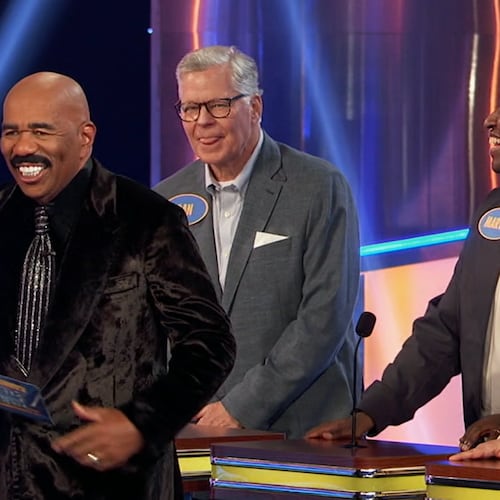Originally posted Thursday, February 27, 2020 by RODNEY HO/rho@ajc.com on his AJC Radio & TV Talk blog
It has been six years since Jay Leno left "The Tonight Show" as host but unlike his predecessor Johnny Carson, he has remained super active.
CNBC has aired 60 episodes of "Jay Leno's Garage." He still pops up on Jimmy Fallon's "Tonight Show" to crack jokes. He was a guest judge on "America's Got Talent." And he continues to do a whopping 210 stand-up tour dates a year, a volume comics half his age would envy.
His latest visit to Atlanta will be at the Cobb Energy Centre on Saturday, March 21. (Tickets here.)
He is also hosting an Artsbridge Foundation gala before his show. (Tickets here.)
"I love being a comic," said 69-year-old Leno in a recent interview. "I'm always stunned when people ask me, 'Why don't you retire?' What's more fun than stand up? I would be doing the same thing at the corner bar telling jokes."
Telling jokes to a live audience is like oxygen to him. And he has told tens of thousands of them over the years.
That is why he refuses to take millions from the likes of Netflix to do a stand-up special. That means he would have to "retire" that material.
And seriously, Leno does not need the money. "I'd rather do 50 shows," he said. "Or 60 shows. I don't want to do just one show for an entire year."
He said he was never an actor. He never tried to micro-manage "The Tonight Show." His primary focus was garnering laughs.
"I've always been a believer in low self esteem," Leno said. "I never think I'm the smartest person in the room. I hired experienced people to produce and direct . I let them do their jobs. I'd watch some music act telling our sound guy how it should sound and the lighting guy how it should look. It never looked or sounded as good."
Leno's monologue over the years got longer and longer, from six to 14 minutes, as he decided to focus on what the viewers wanted and what he loved. That also meant he needed more writers. Eventually, he'd have two shifts of writers; a day shift and a night shift. He let people choose one or the other and work at home if they needed to. He treated them with respect. As a result, he had very little turnover.
And while many people still identify him as a late-night talk show host, he is a stand-up comic first and foremost. "David Letterman was a broadcaster who did comedy," he said. "I am a comedian who did broadcasting. Neither is better or worse. Dave was more comfortable in the broadcast role than I was. I don't think David liked stand up all that much. I remember he opened for Tony Orlando and hated it."
It's hard to believe now but stand-up comics used to open for musical acts like Orlando in the 1960s and 1970s. He remembered opening for R&B act Rare Earth in the early 1970s and the microphone wire was inexplicable in the audience. Someone grabbed the wire and pulled his mic off the stage. "I was chasing after the mic and then it was gone," he said. "I was charged $75 for losing that mic!"
Another time he recalled opening for James Brown in Greenville, S.C. Brown liked to get paid in cash upfront. The promoter, Leno recalled, didn't have the cash in hand but said it was at his home. So Brown, instead of going on stage to start the concert, drove with the promoter to get his money. Leno had to riff an extra hour on stage. "The crowd was yelling, 'Get off the stage [expletive!]'" he said.
He also used to perform at strip joints in the 1970s because comedy clubs didn't really exist. He remembered working at a club in Atlanta he thinks was called the Mine Shaft, which was pitch black. Patrons would pay $10 to rent a miner's helmet with a light on it and he recalled telling jokes in near complete darkness except for random shafts of light. "Strip clubs needed entertainment between the girls," he said.
In 1987, he hosted the White House Correspondents' Dinner, where the comic is supposed to roast the president right in front of said president. One official warned Leno not to be too tough on Ronald Reagan but then Secretary of State George Shultz sidled up to him and told him, "Nail Ronny's [expletive] to the wall." When Leno told him about the other dude's warning, Shultz waved him off, saying "[Expletive] him. He works for me!"
Leno said he was still nervous, opening with a joke about Nancy Reagan winning a humanitarian of the year award. "I'm glad she beat out that conniving [expletive] Mother Theresa!" He heard Ronald Reagan guffaw and knew he was going to be okay.
Nowadays, very little rattles Leno on stage. And his crowds, of course, are adoring. But he recalled a time doing a show in Milwaukee when he heard a person in the crowd crying. "It sounded like someone was being stabbed," he said. So he stopped and asked if that person was okay. A woman said, 'It's my son. He's a big fan. He has Tourette's. He doesn't laugh. He screams.' I couldn't make fun of it. The crowd was so uncomfortable. It sounded like he was being bludgeoned to death!"
And he is glad he doesn't have to make jokes every night on TV in today's environment because of Donald Trump. "It's really hard to do a different version of the same joke every night without being condescending," he said. "There's almost no relief. When everything you say is outrageous, nothing is outrageous."
IF YOU GO
Jay Leno
8 p.m. Saturday, March 21
$55-$145
Cobb Energy Performing Arts Centre
800 Cobb Galleria Pkwy, Atlanta
About the Author
Keep Reading
The Latest
Featured




